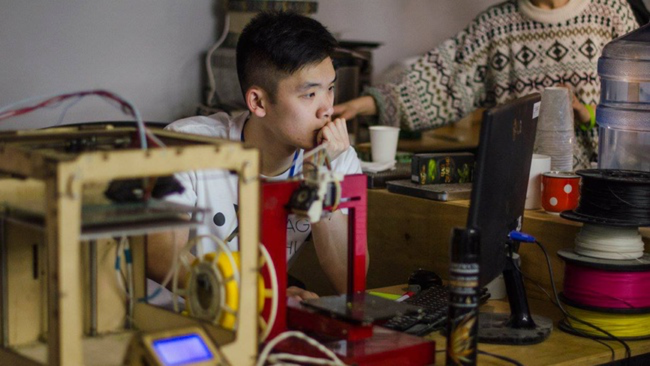Ukraine has been suffering from degradation of higher education: existing universities offer the mostly theoretical courses, the laboratories have not been updated for decades, therefore, the students are supposed to obtain irrelevant and outdated knowledge, non-applicable for modern employment market or private entrepreneurship.
The model of independent fablabs (fabrication laboratories,
https://en.wikipedia.org/wiki/Fab_lab) has been becoming popular recently, reviving the idea of production and fabrication workshops, but spicing it with modern technologies which are easier to use and more attractive to young people. Access to educational opportunities and practical learning allows youth to quickly gain the needed skills to start making their own products: weather it's an interior design item, or a prototype for a more sophisticated gadget. The processes are only facilitated by peer mentors and trainers, promoting the culture of making.
Such model was chosen upon the demand of engineering students who often complaint about over-theoretized education at colleges and universities, and lack of practical classes, which lead to gaining up-to-date skills useful for further work with new and modern companies. The case of Garage Hubs uniques as the youth was driving the process of concept development and creation of space. Currently, the resident of the space are of interest to the IT companies how seek for employees with hard skills and experience in engineering.
Garage Hub was initiated by 4 students who lacked hands-on practice and hardware based experiments in their university. This bottom up initiative originated in a rented garage, that was rebuilt and equipped at their own expense. Within the first 6 months, they were able to carry out Physics experiments, winning one of the most prestigious European academic contests for students (International Physicist tournament) from their garage. Within the succeeding 2 years this place was transformed into one of the most equipped hobby workshops in Kharkiv with self-manufactured CNC machines and 3D printers, organized a community of science enthusiasts. UCBI supported the initiative in opening a first full scale FabLab in the East of Ukraine.
Currently, the team of Garage Hub is operating the space, providing some of the higher level education activities (which are of interest to the people who are already creating income) for fees. The group also has a number of supporters in the community and in business (e.g. companies who would employ better prepared young people) with small donations to cover operation and events at the space. About 10% of the whole project cost was co-funded by Garage Hub team from their own financial resources and in-kind in form of previously designed equipment.
There were no major challenges as the initiative group was very well aware of all the peculiarities of manufacturing and using such equipment. One of the few issues was that the self-make 3D printers were a bit slow when a big demand for 3D printing occurred. As for the advise to other teams who would consider to implement similar projects, we can say that it is really important to have a highly-motivated young team of implementing partner, who are devoted to widen the makers movement to their peers and dedicated to continue work and make the space sustainable.
In a year since its opening the Hub has attracted over a thousand of young people for its activities, with around 150 of residents, who regularly use the hub and its facilities.
This activity stimulated young people to gain practical knowledge and skills on modern equipment for designing and testing various gadgets and prototypes. This knowledge can be used for further professional work in IT sector, innovation companies, or as private entrepreneurs. It also helped youth to find creative and innovative solutions to the problems using modern technologies and quickly acquiring missing skills. One of the resident teams developed a prototype of Braille script e-reader, which can be used to deliver quick messages to people with seeing disabilities.
With USAID support Garage Hub team created several educational videos on usage of some of the equipment pieces available at their space (
https://www.ed-era.com/making/). They are planning to further extend it to a full scale on-line educational course, which would be useful for individuals and organization interested in the culture of makers. Some of the equipment pieces were assembled by the initiators of the project, therefore, they can also add as consultants to developing and constructing 3D printers and CNC machines.
NGO Garage Hub was the local partner for the project, and they are continuing to operate, manage and develop the fablab, inspiring other students and young people to join the makers movement, or create their own independent labs in other cities.
